Peter Moore made footwear an art form.
Paired with a young sports star whose ascendancy defied gravity, Moore’s art inspired a pop-culture phenomenon.
Moore designed the original Air Jordan sneakers.
They were first worn by Chicago Bulls rookie basketball star Michael Jordan in 1984 and then released to the public before the end of the NBA season in the spring of 1985.
The sneaker biz has never been the same.
“The Air Jordan transformed the industry by turning sneakers into objects of pop-culture desire,” sneaker expert and writer Brendan Dunne, co-host of “The Complex Sneakers Podcast,” told Fox News Digital.
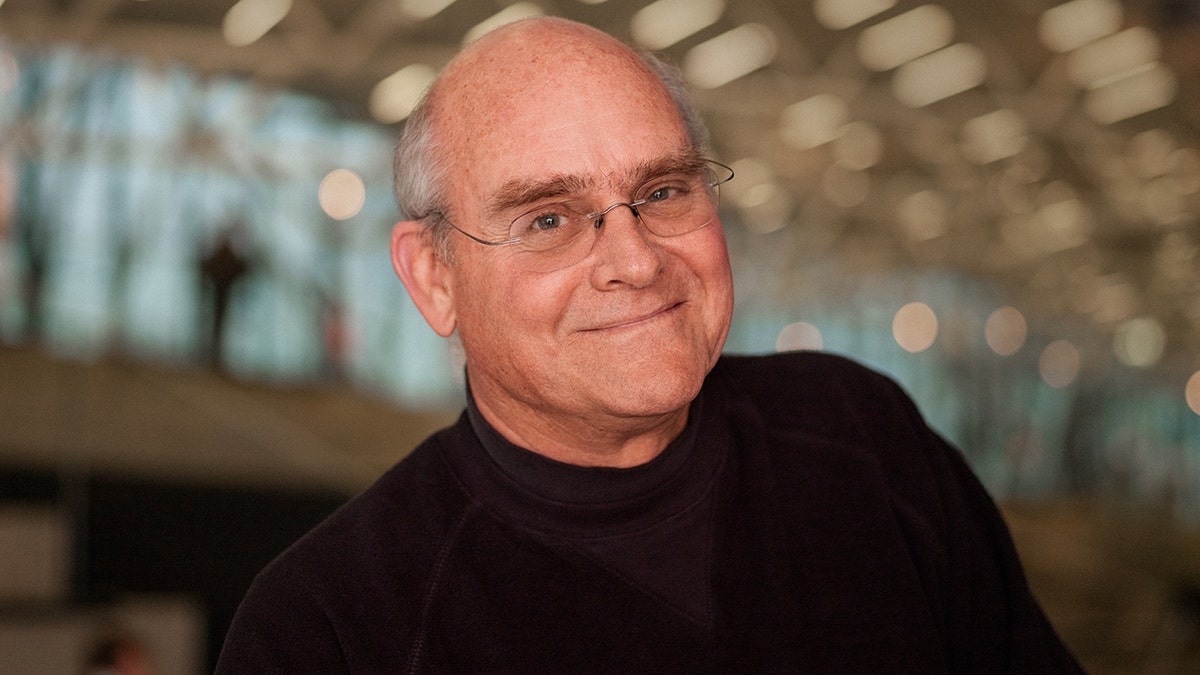
Peter Moore designed Air Jordan sneakers for Nike in 1984 but spent most of his career as a senior executive with Adidas. (Courtesy Adidas)
The original Air Jordan, he added, “set the standard for footwear obsession in America.”
Moore transformed not just the sneaker industry, but global consumer culture, with the power of his imagery.
“The first Air Jordan set the standard for footwear obsession in America.” — Brendan Dunne, sneaker podcaster
He’s best known for his role with Nike.
Moore worked with company executives to land Jordan as a client at the start of his NBA career in 1984, then worked with the budding superstar to create Air Jordan sneakers.
But Moore spent most of his career with Adidas, where he worked in various executive capacities for more than a quarter of a century.

A pair of basketball legend Michael Jordan’s famous Air Jordans from his rookie season are seen on April 28, 2021, in Geneva during a preview of sale by auction house Sotheby’s, entitled “Gamers Only.” (Fabrice COFFRINI / AFP via Getty Images)
Among other highly visible contributions to global brand culture, Moore created the Nike Jumpman logo in 1988, now the icon that represents Jordan Brands, and the familiar Adidas three-stripe mountain logo, which debuted in 1991.
Most Air Jordans after Moore’s original were designed by Tinker Hatfield. But Moore’s were the first, and his legacy appears to have only grown in the year since he died.
Sotheby’s sold a pair of Air Jordan 13 sneakers, which Jordan wore in the 1998 NBA championships, for $2.2 million at auction in April 2023 — the most expensive footwear in world history.
The creation of Air Jordan sneakers was such an iconic moment in pop-culture history that the story behind it became the subject of a new star-studded Hollywood production.

Ben Affleck and Matt Damon attend Amazon Studios’ world premiere of “Air” at Regency Village Theatre on March 27, 2023, in Los Angeles. (JC Olivera/GA/The Hollywood Reporter via Getty Images)
“Air,” released in April 2023, starred Ben Affleck as Nike co-founder Phil Knight, Matt Damon as legendary Nike dealmaker Sonny Vaccaro and Matthew Maher as Moore.
It offers a dramatized account of the sports-marketing deal that changed global consumer history.
Son of a sailor
Peter Colin Moore was born on Feb. 21, 1944, in Cleveland to Raymond and Mary (Jameson) Moore.
CLICK HERE TO SUBSCRIBE TO FOX NATION
His father was a career Navy officer and the family moved to California when Peter Moore was just a boy.
He was raised in Chula Vista, near San Diego.

The Air Jordan logo is seen in a shoe store in Krakow, Poland, on August 26, 2021. (Jakub Porzycki/NurPhoto via Getty Images)
Moore appears to have struggled to find his way in life as a young artist. He studied art and architecture at three different colleges before graduating from Chouinard Art Institute in 1968.
He founded Peter Moore Graphic Design in 1970, briefly worked as creative director for Georgia-Pacific in 1972-73, then returned to his own pursuits and landing Nike as a client in 1977.
Nike hired him in 1983 as its first creative director, just as Jordan was emerging as a transcendent star on the basketball court for the University of North Carolina. Jordan, most notably, hit the game-winning shot as a 19-year-old freshman in the 1982 NCAA championship game.
“Corporate environments were not a natural habitat for Moore,” Dunne, the sneaker expert and podcaster, wrote for Complex.com.
“His coworkers have described Moore as a private, philosophical man who could summon dry humor at the right moment. He was calm by default, but could be animated by the battles of the sneaker industry.”
Among other qualities, the normally quiet son of a U.S. Navy officer “wielded an array of curses that could make a sailor blush,” Dunne added.
“The idea was to break the color barrier in footwear.” — Peter Moore
Moore proved a central part of the team that put a full-court press on Jordan during his rookie season with the Chicago Bulls.
The sneaker deal was not the slam-dunk between brand and athlete we know and expect today.
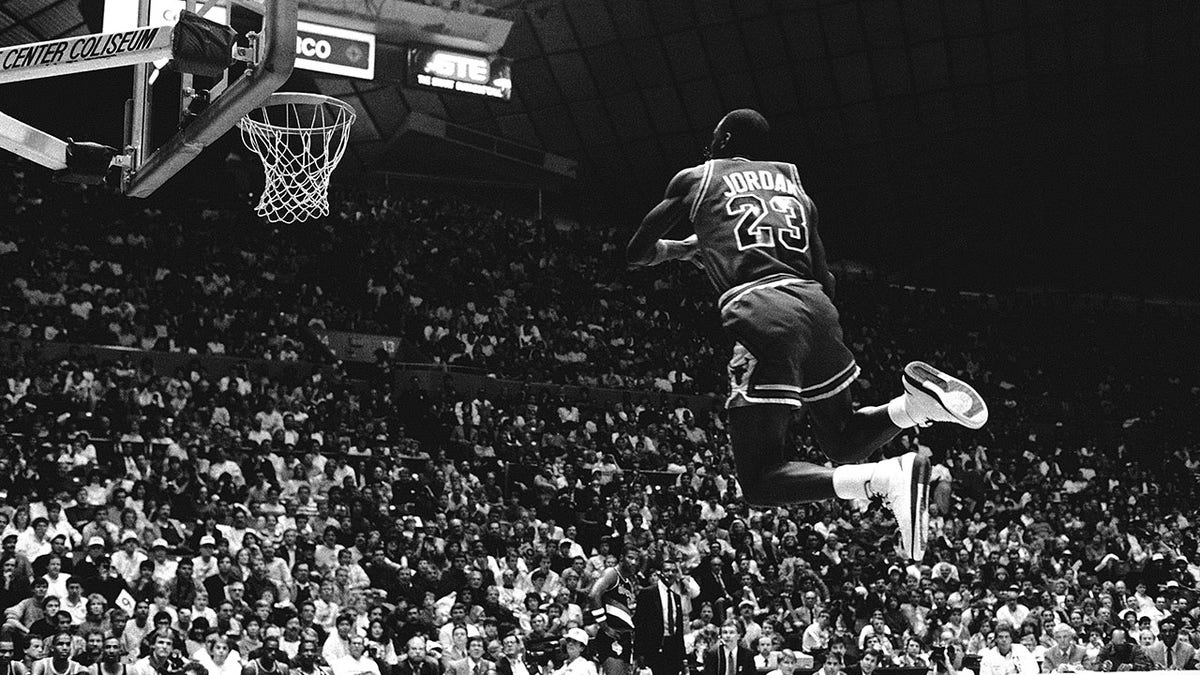
Michael Jordan #23 of the Chicago Bulls attempts a dunk during the 1987 Slam Dunk Contest on Feb. 7, 1987, at Seattle Center Coliseum in Seattle, Washington. Copyright 1987 NBAE. (Nathaniel S. Butler/NBAE via Getty Images)
Nike was still a fairly new company in 1984. The modern sneaker itself was fairly new, invented only 20 years earlier by University of Oregon track coach Bill Bowerman.
He founded Blue Ribbon Sports — soon to be renamed Nike — with Phil Knight in 1964.
Moore was reportedly wowed by the young basketball player in early meetings, calling him “tall, handsome, innately graceful” and “a kind of young American prince,” according to the 1999 David Halberstam book, “Playing for Keeps: Michael Jordan and the World He Made.”
Jordan was convinced enough by the aggressive young company’s pitch, its promise of millions — and the then unheard-of idea of a signature shoe made just for him — to ink his name with Nike.
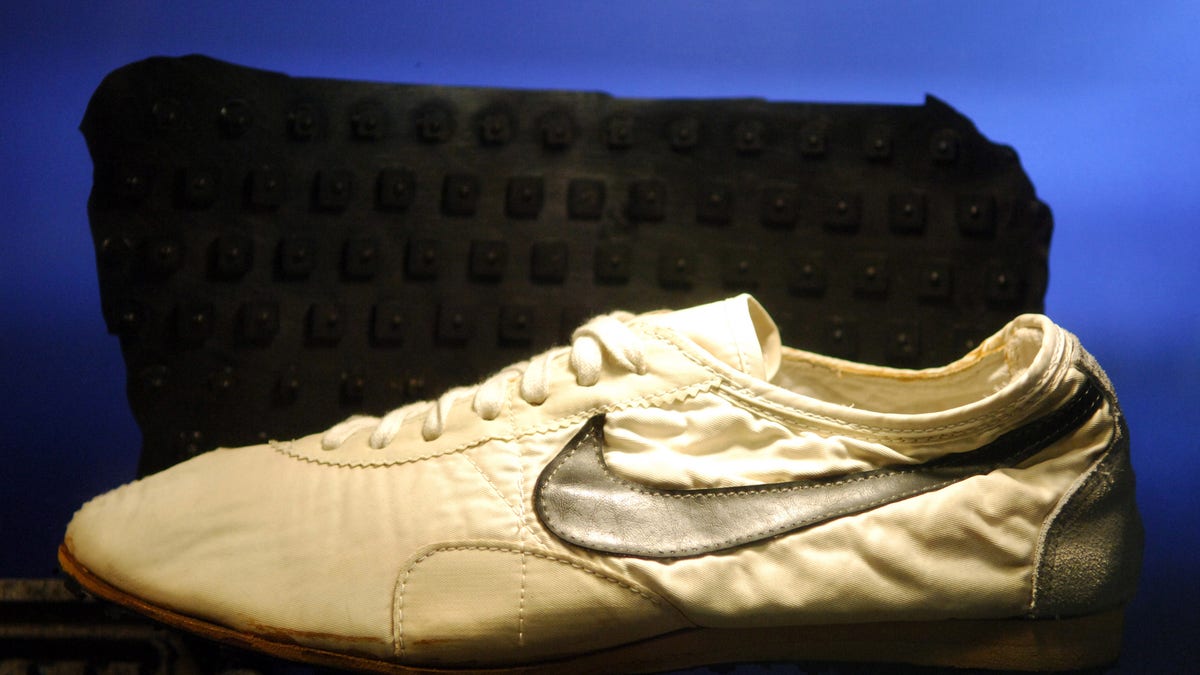
The Air Jordan in 1984 represented a major advancement in sneaker technology in design. Nike’s “Moon Shoe” shown here, worn by Mark Covert in the 1972 U.S. Olympic Trials in Eugene, Oregon, was the first Nike sneaker worn in competition. The waffle-soled shoes were made by Nike co-founder Bill Bowerman in a waffle iron at home. (Kirby Lee/WireImage)
That initial deal was reportedly for five years and worth $2.5 million, plus royalties, according to several sources.
The numbers seem paltry by today’s standards — but they were groundbreaking at the time and the foundation upon which many future deals were built. It was three times more money spent on any previous sneaker deal, according to industry sources.
The debate over who gets credit for the Nike-Jordan deal has ignited sports-talk and sneaker-chatter controversy for decades.
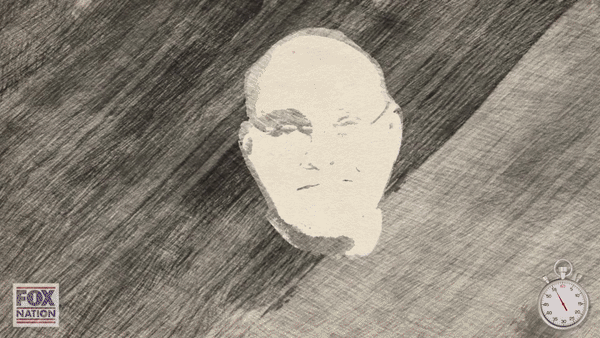
Air Jordan creator Peter Moore, born in Cleveland, made footwear an art form. (Fox Nation)
Knight, at least, tipped his cap to Moore and former Nike marketing executive Rob Strasser (also now deceased), calling them “the MVPs in the deal” in a 2015 interview with USA Today.
Breaking the color barrier in footwear
Moore and Jordan soon went to work on the signature sneaker.
Jordan wanted a shoe low to the ground “so he could feel the floor,” according to numerous accounts of the birth of Air Jordan.
The sneakers boasted an innovative feature: a pocket of compressed air in the sole to cushion the impact — and make them lighter and airier.

Michael Jordan attends a press conference for the celebration of the 30th anniversary of the Air Jordan shoe during the “Palais 23” interactive exhibition dedicated to Jordan at Palais de Tokyo in Paris on June 12, 2015, in Paris, France. (Catherine Steenkeste/Getty Images)
The light-as-air sole gave even ordinary schoolyard hoopsters the feeling that they, too, could take flight like Jordan.
In addition to the innovations of the original Air Jordan was its incredible-for-its-day eye-catching colors: red leather bands around the ankle and toe, black laces and black Nike swoosh, against a white backdrop.
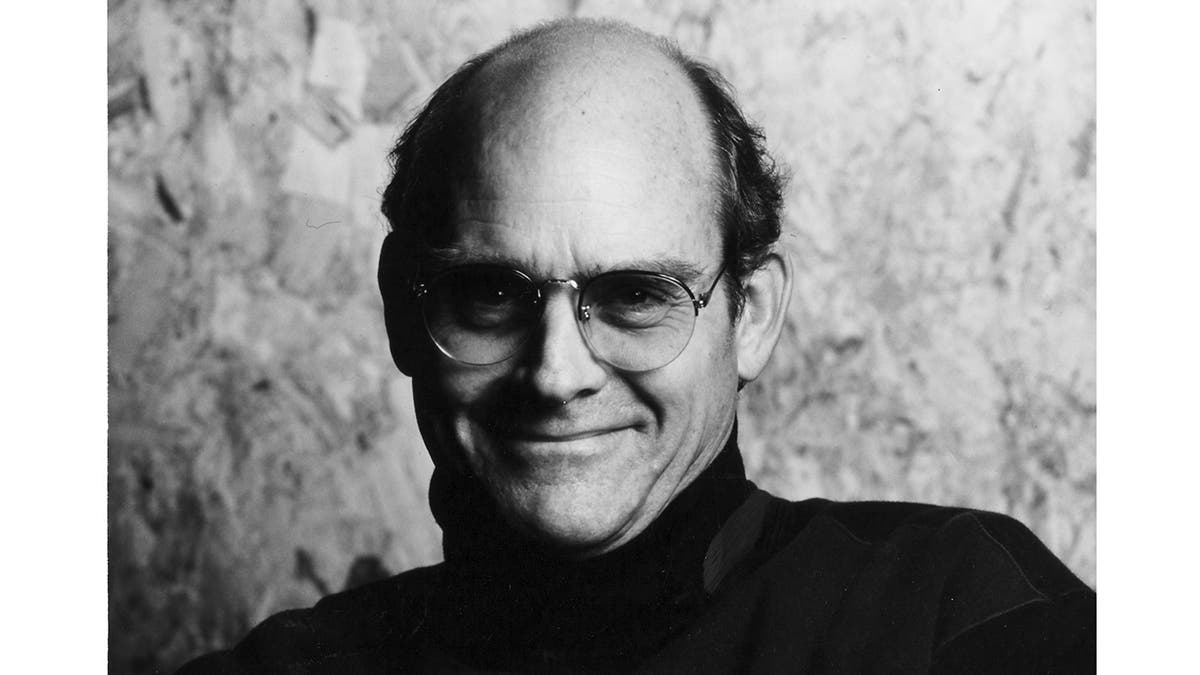
Peter Moore, seen here in 1991, is one of the most influential figures in the history of consumer culture, providing artistic vision for both Nike, where he designed Air Jordan sneakers, and Adidas. (Courtesy Adidas)
“The idea was to break the color barrier in footwear,” Moore wrote in his 1995 book, “Peter Moore: A Portfolio.”
“Prior to that, 99% of shoes were white or black, so I decided to design a shoe that would really take color well. And the colors were red, black and white” — the colors, he added, of the Chicago Bulls.
“Nike had expected to sell only 100,000 pairs of the $65 shoes in the first year. Instead, it shipped 1.5 million in the first six weeks.” — The Ringer
The NBA attempted to ban the sneakers for failing to meet league-wide uniform regulations.
“Jordan wore them anyway and faced a $5,000-per-game fine as a result,” FootLocker.com notes in its lengthy Air Jordan history.
“Recognizing a unique marketing opportunity when it presented itself, Nike happily paid the fine. And MJ rocked them all the way to Rookie of the Year honors.”
The game-day fines proved one of the great investments of all time.
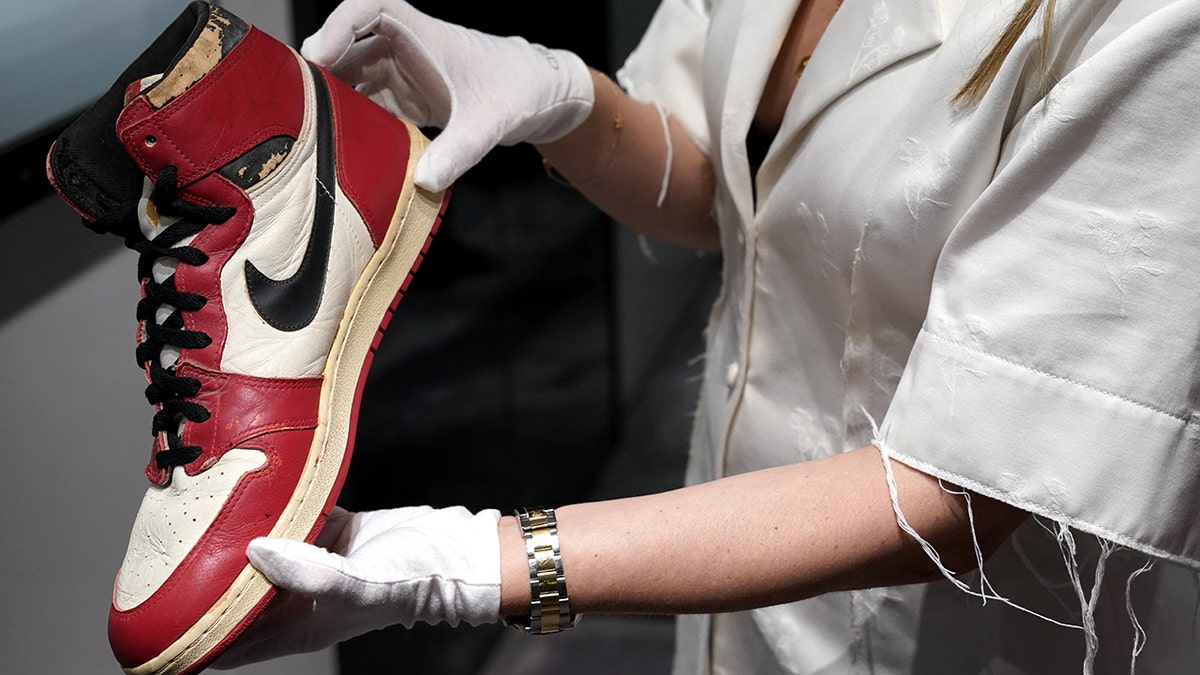
Caitlin Donovan, Christie’s head of Sales, Handbags and Accessories, holds the Air Jordan 1 High Shattered Backboard Origin Story, Game-Worn Signed Sneaker Nike, 1985, Size 13.5 High-Top on display during a press preview July 24, 2020, at Christie’s New York. Christie’s and Stadium Goods partnered to offer a unique sneaker overview of Michael Jordans era-defining Chicago Bulls career. (TIMOTHY A. CLARY/AFP via Getty Images)
“Nike had expected to sell only 100,000 pairs of the $65 shoes in the first year,” said sports website The Ringer. “Instead, it shipped 1.5 million in the first six weeks.”
Nike had a goal of making $3 million with those first Air Jordans, Sports Illustrated noted last year. It added, “The first shoe shattered expectations, earning $126 million in one year.”
For more Lifestyle articles, visit foxnews.com/lifestyle
The original Air Jordans had one distinction among all the others that followed: It’s the only Air Jordan made with the signature Nike swoosh.
The now-familiar Jumpman logo, which Moore designed, was added to the Air Jordan III in 1988, the sneaker itself designed by Hatfield.

Peter Moore is best known as the designer behind the original Air Jordan sneakers. But he spent most of his career as an executive with Adidas where, among many other contributions, he designed its familiar three-stripe mountain logo. (Courtesy Adidas)
The value of the Air Jordans grew as Jordan’s dominance on the court grew.
He ended his career leading the Chicago Bulls to six-time NBA championships and is widely regarded as the greatest player in basketball history.
Moore gave global dream shape, form and color
Peter Moore died on April 29, 2022.
He was 78 years old.
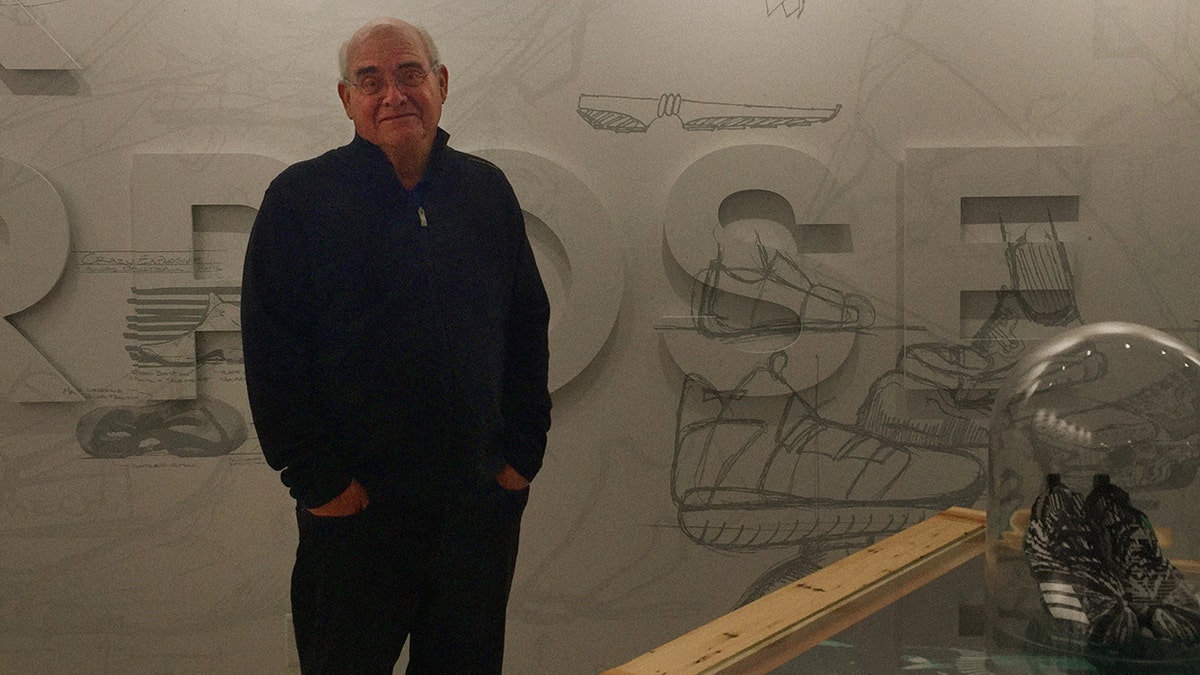
Sneaker-industry executive Peter Moore, a key figure in the history of both Nike and Adidas, died on April 29, 2022, at age 78. (Courtesy Adidas)
His innovative sneaker design helped make both Michael Jordan and Nike titans of the global sports world.
Nike is the world’s largest sneaker company, a global colossus that boasted an incredible $50.6 billion in revenue for the year ended Feb. 28, 2023.
Moore’s creation is so iconic it spawned a new Hollywood version of the events that brought a sneaker to life.
Jordan parlayed those first royalties and then future deals to become the world’s first $1 billion athlete.
He’s now worth $1.7 billion, according to various sports-industry estimates.
The success of Air Jordan sneakers inspired the creation of Nike’s Jordan Brand in 1997.

Michael Jordan’s 1998 NBA Finals Game 2 Air Jordan XIIIs are on display during VICTORIAM, a special two-part curated collection of sports artifacts on auction at Sotheby’s on April 5, 2023, in New York City. They sold for a sneaker-record $2.2 million. (Cindy Ord/Getty Images)
The Jordan Brand generated $5.1 billion in revenue in 2022, with Jordan pocketing 5% of that, according to Front Office Sports — or $256 million from the Jordan Brand alone last year.
He made “just” $90 million during his entire NBA playing career, the same source notes.
Moore’s creation is so iconic it spawned a new Hollywood version of the events that brought a sneaker to life.
CLICK HERE TO SIGN UP FOR OUR LIFESTYLE NEWSLETTER
“Air,” with the famous Affleck-Damon tandem in starring roles, has brought the Air Jordan story to theaters around the world.
“Nike nabbed Jordan by creating a shoe that wasn’t just for him but of him,” writes RogerEbert.com in its review of the new flick.
“The representation of his soon-to-be iconic persona in a form that made us feel as if we, too, could reach such heights.”
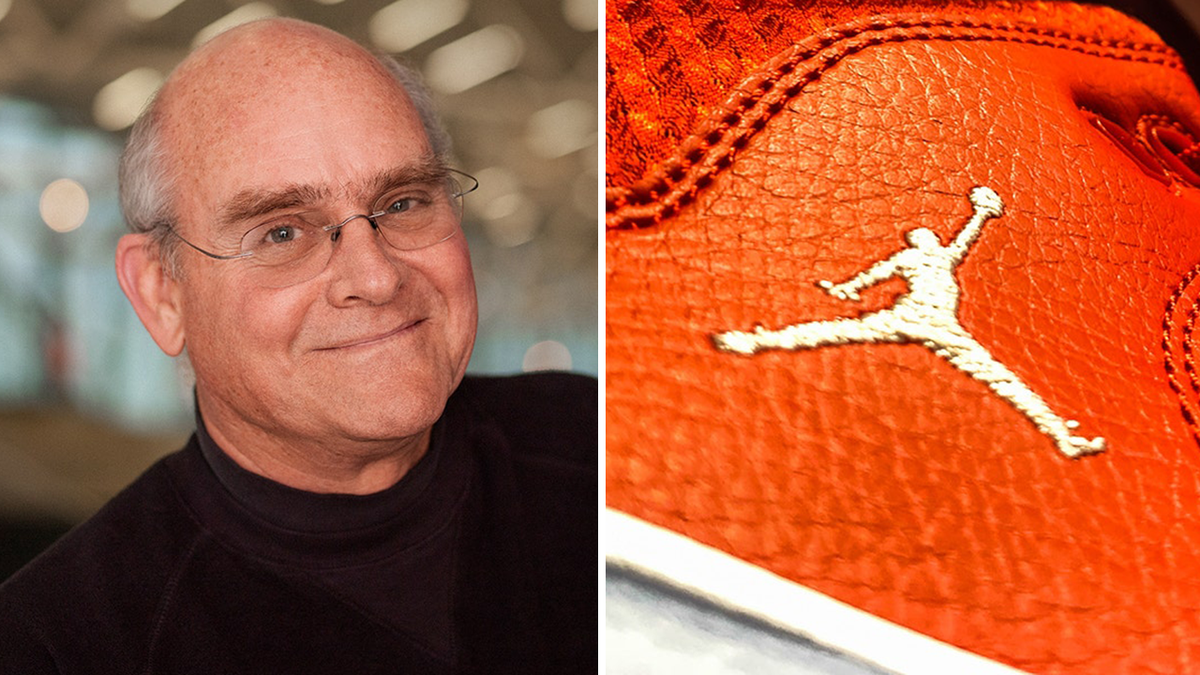
Peter Moore, left, designed the original Air Jordan sneakers in 1984, released to the public in 1985. The Jumpman logo, which he also created, first appeared on the Air Jordan III in 1988, though the sneaker itself was designed by Tinker Hatfield. Moore spent most of his career with Adidas. (Adidas/Getty Images)
Moore gave those dreams of new heights shape, form and color.
“Peter was a true legend and icon in our industry,” Rich Efrus told, spokesman for Adidas, where Moore spent most of his career, told Fox News Digital.
CLICK HERE TO GET THE FOX NEWS APP
He echoed sentiments that appeared in a company statement after Moore died last year.
“He is greatly missed and his legacy will live on forever.”
To read more stories in this unique “Meet the American Who…” series from Fox News Digital, click here.
